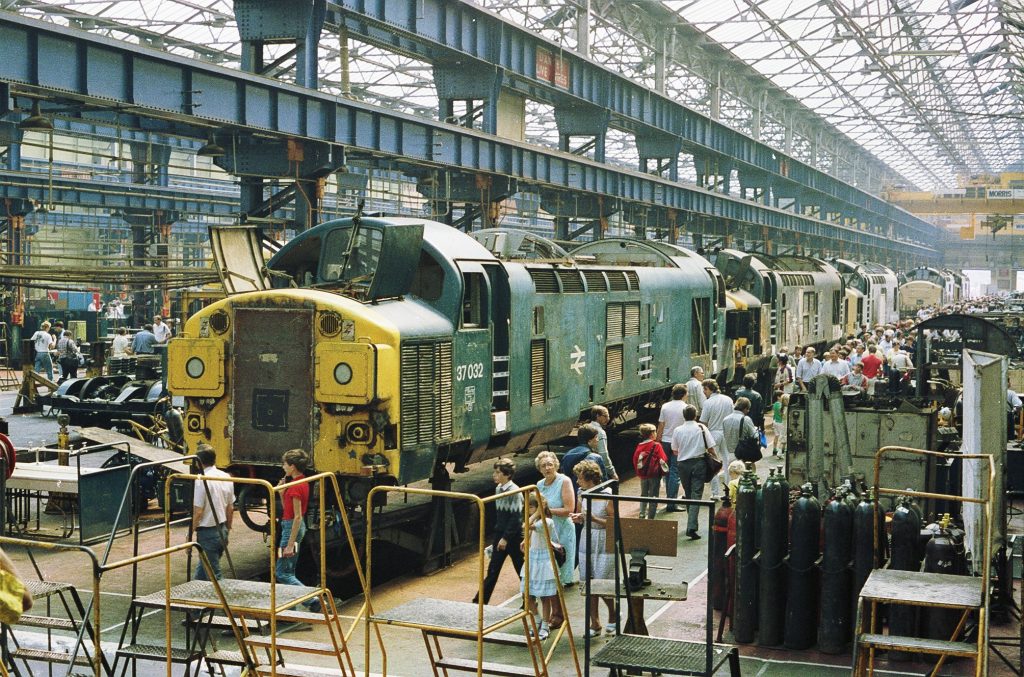BREL Doncaster was a regular visit for me, and the huge engineering plant and super-sized engines they worked on, were so impressive to a 10-year-old. The Deltics were just still in service, although 55001 St Paddy and 55020 Nimbus were to be the first withdrawals in 1978. A letter to the manager applying for an apprenticeship in 1984 was politely declined as I did not live in the Doncaster metropolitan area. I had to make do with the regular Sunday teatime tour.
British Rail Engineering Ltd (BREL) was a wholly-owned subsidiary of the British Railways Board. Created through the Transport Act 1968, BREL began trading in 1970 under managing director A.E. Robson.
The company was created to manage British Rail’s thirteen workshops, replacing the British Rail Workshops Division. The works managed by BREL were Ashford, Crewe, Derby Locomotive Works, Derby Litchurch Lane, Doncaster, Eastleigh, Glasgow (formerly St Rollox), Horwich Foundry, Shildon, Swindon, Temple Mills, Wolverton, and York.
I was lucky enough to visit most with the exceptions being Glasgow, Swindon and Temple Mills.
The primary object of BREL was to provide a construction, maintenance, and repair service to Britain’s railways. BREL produced most of British Rail’s new locomotives and carriages. These included the Class 141, 142 and 144 Railbuses, as well as the Mark III coach, used on all BR’s 125mph trains for inter-city travel. The company also overhauled BR’s fleet of locomotives and rolling stock, including passenger coaches. At one time, it was also the principal UK manufacturer of wagons for coal and freight.
In addition to carrying out work for BR, the Transport Act 1968 allowed BREL to use the spare capacity of its main works to manufacture for outside industry. In 1971, BREL formed BRE-Metro Ltd, a joint company with Metro-Cammell Ltd. This was to promote export sales of locomotives and rolling stock. Export contracts included the manufacture of coaches for the Northern Ireland Railway and Coras Iompair Eirann, and wagons for railways in Sweden, Malaysia, Yugoslavia and Bangladesh. BREL also supplied components and general engineering equipment to a wide range of non-railway customers, including the British Steel Corporation.
During the 1980s, BREL began a major project of rationalisation. Ashford Works, which had been gradually run down throughout the 1970s, was closed in 1981. Temple Mills Works, which mainly carried out wagon maintenance, was closed in 1983, and its work transferred to Doncaster. Shildon Works was closed in 1984, with Swindon following in 1986. In May 1987, the wagon department at Doncaster was separated from the rest of the works, and was sold to RFS Industries as Doncaster Wagon Works Ltd.
In 1987, the remaining BREL workshops were split into three distinct groups. Eastleigh, Wolverton, Doncaster and Glasgow were formed into BR Maintenance Ltd, a new British Railways Board subsidiary. Horwich Foundry was transferred to a new, separate subsidiary company, and was sold in 1988. Crewe, York, and the two works in Derby became BREL (1988) Ltd. In April 1989, BREL (1988) Ltd was sold to a consortium of BREL management and employees, the Swiss-Swedish conglomerate Asea Brown Boveri (ABB), and Trafalgar House. Asea Brown Boveri later bought out Trafalgar House, and in 1992 the company was renamed ABB Transportation Ltd.
In 1996, BREL York closed.
In 2005 the Metro-Cammell plant in Washwood Heath, Birmingham closed which meant that for ten years from 2005 to 2015 Bombardier's former BREL site, the Derby Litchurch Lane Works, was the sole plant in the UK actively manufacturing stock. This unique role was ended by Hitachi and John Laing in 2015 when they opened the new Agility Trains factory in County Durham. CAF also built CAF Newport, a £30 million factory at Llanwern near Newport.
Most of the sites have now been redeveloped, however some still stand. BREL Doncaster is a shadow of its once sprawling site and only carries out limited work. The general state of repair of the main building and overgrown weeds make unhappy viewing.
In July 2003 July ‘The Plant' celebrated its 150th anniversary, with an open weekend. Subsequently the Doncaster site became Wabtec Rail refurbishing railway passenger trains, including the Waterloo and City Line underground trains as well as heavy maintenance, interior upgrades and refurbishments of DMUs, EMUs, High Speed Trains, locomotives and coaching stock for the UK’s rolling stock leasing companies and train operators.

